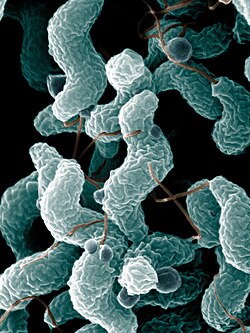カンピロバクター目
カンピロバクター目(-もく、Campylobacterales)は真正細菌Pseudomonadota門イプシロンプロテオバクテリア綱の目の一つである。グラム陰性。種で最大のグループは微好気性生物である[1]。
| カンピロバクター目 | ||||||||||||
|---|---|---|---|---|---|---|---|---|---|---|---|---|
 カンピロバクター・ジェジュニ (Campylobacter jejuni)の走査型電子顕微鏡画像
| ||||||||||||
| 分類 | ||||||||||||
| ||||||||||||
| 学名 | ||||||||||||
| Campylobacterales Garrity et al. 2006[1] (IJSEMリストに掲載 2006)[2] | ||||||||||||
| タイプ属 | ||||||||||||
| カンピロバクター属 Campylobacter Sebald and Véron 1963[3] (IJSEMリストに掲載 1980)[4] 修正 Tanner et al. 1981[5] Vandamme et al. 1991[6] (IJSEMリストに掲載 1991)[7] Vandamme et al. 2010[8] (IJSEMリストに掲載 2010[9]) | ||||||||||||
| 下位分類(科)(2024年7月現在)[18] | ||||||||||||
|
分子生物学的特徴
編集2006年に報告されたゲノムの比較解析により、カンピロバクター目のほぼすべての種に特有の49種類のタンパク質が特定された。加えて、2種の保存シグネチャーインデルが特定されており、これらは特有タンパク質とともに、目の分子マーカーとして利用できる。このインデルはUvr ABCエンドヌクレアーゼシステムのアミノ酸3個の挿入、及びフェニルアラニンtRNA合成酵素のアミノ酸2個の欠失である。
系統発生
編集現在の分類体系はList of Prokaryotic names with Standing in Nomenclature(LPSN)[18]とアメリカ国立生物工学情報センター(NCBI)[19]により提供されている。
| ||||||||||||||||||||||||||||||||||||||||||||||||||||||||||||||||||||||||||||||||||||||||
| Campylobacterales |
| |||||||||||||||||||||||||||||||||||||||||||||||||||||||||||||||||||||||||||||||||||||||||||||||||||||||||||||||||||||||||||||||||
脚注
編集- ^ a b Garrity GM, Bell JA, Lilburn T (2005). “Order I. Campylobacterales ord. nov.”. In Garrity, George M.; Brenner, Don J.; Krieg, Noel R.; Staley, James T. Bergey's Manual of Systematic Bacteriology, Volume Two: The Proteobacteria, Part C: The Alpha-, Beta-, Delta-, and Epsilonproteobacteria. Springer, New York. p. 1145
- ^ a b “List of new names and new combinations previously effectively, but not validly, published”. International Journal of Systematic and Evolutionary Microbiology: 1-6. (01 January 2006). doi:10.1099/ijs.0.64188-0.
- ^ M SEBALD, M VERON (1963 Nov). “[BASE DNA CONTENT AND CLASSIFICATION OF VIBRIOS]”. Ann Inst Pasteur (Paris) 105: 897-910. PMID 14098102.
- ^ V. B. D. Skerman, Vicki. McGOWAN and P. H. A. Sneath (01 January 1980). “Approved Lists of Bacterial Names”. International Journal of Systematic and Evolutionary Microbiology 30 (1): 225-420. doi:10.1099/00207713-30-1-225.
- ^ Anne C. R. Tanner, Shirley. Badger, C.-H. Lai, Max A. Listgarten, Roberta A. Visconti and Sigmund S. Socransky (01 October 1981). “Wolinella gen. nov., Wolinella succinogenes (Vibrio succinogenes Wolin et al.) comb. nov., and Description of Bacteroides gracilis sp. nov., Wolinella recta sp. nov., Campylobacter concisus sp. nov., and Eikenella corrodens from Humans with Periodontal Disease”. International Journal of Systematic and Evolutionary Microbiology 31 (4): 2016-2022. doi:10.1099/00207713-31-4-432".
- ^ P Vandamme, E Falsen, R Rossau, B Hoste, P Segers, R Tytgat, J De Ley (01 January 1991). “Revision of Campylobacter, Helicobacter, and Wolinella Taxonomy: Emendation of Generic Descriptions and Proposal of Arcobacter gen. nov.”. International Journal of Systematic and Evolutionary Microbiology 41 (1): 88-103. doi:10.1099/00207713-41-1-88. PMID 1704793.
- ^ “Notification that New Names and New Combinations Have Appeared in the IJSB”. International Journal of Systematic and Evolutionary Microbiology 41 (3): 457-458. (01 July 1991). doi:10.1099/00207713-41-3-457.
- ^ P. Vandamme, L. Debruyne, E. De Brandt and E. Falsen (01 September 2010). “Reclassification of Bacteroides ureolyticus as Campylobacter ureolyticus comb. nov., and emended description of the genus Campylobacter”. International Journal of Systematic and Evolutionary Microbiology 60 (9): 2016-2022. doi:10.1099/ijs.0.017152-0. PMID 19801389.
- ^ “Notification that new names and new combinations have appeared in volume 60, part 9, of the IJSEM”. International Journal of Systematic and Evolutionary Microbiology 60 (12): 2695-2696. (01 December 2010). doi:10.1099/ijs.0.029710-0.
- ^ a b c David W Waite, Inka Vanwonterghem, Christian Rinke, Donovan H Parks, Ying Zhang, Ken Takai, Stefan M Sievert, Jörg Simon, Barbara J Campbell, Thomas E Hanson, Tanja Woyke, Martin G Klotz, Philip Hugenholtz (24 April 2017). “Comparative Genomic Analysis of the Class Epsilonproteobacteria and Proposed Reclassification to Epsilonbacteraeota (phyl. nov.)”. Frontiers in Microbiology 8: 682. doi:10.3389/fmicb.2017.00682. PMC PMC5401914. PMID 28484436.
- ^ a b Aharon Oren and George M. Garrity (29 May 2020). “List of new names and new combinations previously effectively, but not validly, published”. International Journal of Systematic and Evolutionary Microbiology 70 (5): 2960-2966. doi:10.1099/ijsem.0.004156.
- ^ P. Vandamme and J. De Ley (01 July 1991). “Proposal for a New Family, Campylobacteraceae”. International Journal of Systematic and Evolutionary Microbiology 41 (3): 451-455. doi:10.1099/00207713-41-3-451.
- ^ “Notification that New Names and New Combinations Have Appeared in the IJSB”. International Journal of Systematic and Evolutionary Microbiology 41 (4): 581. (01 October 1991). doi:10.1099/00207713-41-4-581.
- ^ Garrity GM, Bell JA, Lilburn T (2005). “Family II. Helicobacteraceae fam. nov.”. In Garrity, George M.; Brenner, Don J.; Krieg, Noel R.; Staley, James T. Bergey's Manual of Systematic Bacteriology, Volume Two: The Proteobacteria, Part C: The Alpha-, Beta-, Delta-, and Epsilonproteobacteria. Springer, New York. p. 1168
- ^ David W. Waite, Maria S. Chuvochina, Philip Hugenholtz (16 September 2019). “Road Map of the Phylum Campylobacterota”. Bergey's Manual of Systematics of Archaea and Bacteria. doi:10.1002/9781118960608.bm00040
- ^ Adrien Assié, Nikolaus Leisch, Dimitri V Meier, Harald Gruber-Vodicka, Halina E Tegetmeyer, Anke Meyerdierks, Manuel Kleiner, Tjorven Hinzke, Samantha Joye, Matthew Saxton, Nicole Dubilier, Jillian M Petersen (27 September 2019). “Horizontal acquisition of a patchwork Calvin cycle by symbiotic and free-living Campylobacterota (formerly Epsilonproteobacteria)”. The ISME Journal 14 (1): 104–122. doi:10.1038/s41396-019-0508-7. PMC 6908604. PMID 31562384.
- ^ Aharon Oren and George M. Garrity (31 January 2022). “CANDIDATUS LIST No. 3. Lists of names of prokaryotic Candidatus taxa”. International Journal of Systematic and Evolutionary Microbiology 72 (1): 5186. doi:10.1099/ijsem.0.005186.
- ^ a b Jean P. Euzéby, Aidan C. Parte. “Order Campylobacterales”. List of Prokaryotic names with Standing in Nomenclature (LPSN). 2024年7月22日閲覧。
- ^ Sayers. “Campylobacterales”. National Center for Biotechnology Information (NCBI) taxonomy database. 2023年9月9日閲覧。
- ^ “GTDB release 08-RS214”. Genome Taxonomy Database. 2023年5月10日閲覧。
- ^ “bac120_r214.sp_label”. Genome Taxonomy Database. 2023年5月10日閲覧。
- ^ “Taxon History”. Genome Taxonomy Database. 2023年5月10日閲覧。
- ^ “GTDB release 08-RS214”. Genome Taxonomy Database. 2023年5月10日閲覧。
- ^ “bac120_r214.sp_label”. Genome Taxonomy Database. 2023年5月10日閲覧。
- ^ “Taxon History”. Genome Taxonomy Database. 2023年5月10日閲覧。